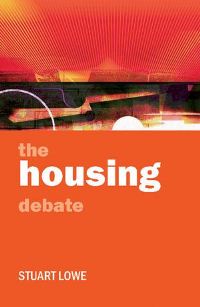 Across Europe, housing shortages and the negative effects this brings for renters, mortgage-payers and those in social housing is rarely out of the news, making Stuart Lowe’s account of the current situation a relevant introduction to the topic. Kerwin Datu would have valued more answers from Lowe on where we can go next, however.
Across Europe, housing shortages and the negative effects this brings for renters, mortgage-payers and those in social housing is rarely out of the news, making Stuart Lowe’s account of the current situation a relevant introduction to the topic. Kerwin Datu would have valued more answers from Lowe on where we can go next, however.
 The Housing Debate. Stuart Lowe. Polity Press. 280 pages. September 2011.
The Housing Debate. Stuart Lowe. Polity Press. 280 pages. September 2011.
There are many big issues affecting UK housing today. The impact of the financial crisis on prices and mortgages, the ghettoisation of council estates, and the imbalance of home ownership and renting have all had immense press coverage over the last few years, and academics too have attempted to focus on the effects of housing shortages and urban redevelopment as the struggle for an answer continues. The capital’s housing shortage is now also at the centre of the London Mayoral Election campaign, as candidates promise to address problems in the hope of winning votes.
In The Housing Debate, Stuart Lowe, Senior Lecturer in Social Policy at the University of York, does not attempt to tackle these debates head on, but instead provides readers with a solid historical, geographic and theoretical foundation on which to build their views. Historical, in that the emergence and evolution of the ‘housing question’ is traced from the collapse of the landlord-tenant paradigm in the Victorian era, to the massive building programmes of the government and the consumer housing of the private sector, to the entrenchment of the home-ownership culture and the globalisation of mortgage finance. Geographic, in that this history is laid out against a backdrop of parallel shifts in countries throughout Northern Europe, which from similar starting points drifted towards rather different balances of state versus private construction and ownership versus renting. And theoretical, in that these evolutions are explained by a political scientist through an institutionalist lens, in which different balances of power between trade unions, petty landlords and big business made certain solutions to the housing question more politic in one country than in another, creating institutions that channelled the policy choices of future generations either towards an ownership culture or an ownership/rental hybrid.
 Lowe’s subsequent argument is important because it broadens the field in which contemporary housing debates are argued. Housing is not simply an end in itself, but is also a means to fulfil other needs. More than a question of how best to satisfy housing demand, Lowe argues that housing policies must also be understood in terms of the whole architecture of the welfare regime. We are not simply moving from a welfare state towards a neo-liberal society, in which social housing is increasingly a ‘residual’ option. Rather we are moving from a regime in which families’ welfare strategies depend on state redistribution to one where they depend on the asset value of their homes to act as a savings base and as ‘insurance against life’s problems and necessities’- an equity-as-welfare state.
Lowe’s subsequent argument is important because it broadens the field in which contemporary housing debates are argued. Housing is not simply an end in itself, but is also a means to fulfil other needs. More than a question of how best to satisfy housing demand, Lowe argues that housing policies must also be understood in terms of the whole architecture of the welfare regime. We are not simply moving from a welfare state towards a neo-liberal society, in which social housing is increasingly a ‘residual’ option. Rather we are moving from a regime in which families’ welfare strategies depend on state redistribution to one where they depend on the asset value of their homes to act as a savings base and as ‘insurance against life’s problems and necessities’- an equity-as-welfare state.
It must be said that we have not completed this transition, but it is clear that we must start debating the implications of the model. What happens when the state begins to depend on housing to fund our welfare needs, rather than the other way around? What new demands will a home-owning class impress upon the political system, especially with regards to taxation and expenditure, and what new policy paradigm will it create in response? What new inequalities will widen between home-owners and renters as this paradigm is locked in?
Having brought us to the brink of these questions, however, Lowe stops well short of speculating on the answers. The reader is left with the sense that one still does not know any better how to navigate the future, despite the exemplary history lesson that one has just received. The Housing Debate is remarkably well-structured and digestible for a piece of academic work; it would have been wonderful if Lowe had found a way not only to answer the questions he has created in the reader’s mind, but also to tie these answers back to some of the more popular policy debates mentioned above.
To consider some fairly perverse examples, how might one’s views on the ownership versus renting debate change if one saw it as a welfare policy issue rather than a housing accessibility issue? Could the choice to rent come to be seen as a failure to ensure one’s long-term welfare, rather than simply a desire for flexibility? Might those who choose to buy their homes be denied health or education subsidies in the future, on the argument that their equity should cover these costs rather than the state? The Housing Debate does not entertain such discussions, but at least it leaves readers better informed to speculate for themselves.




